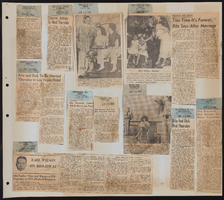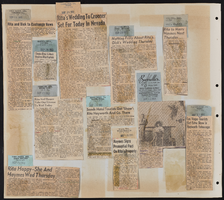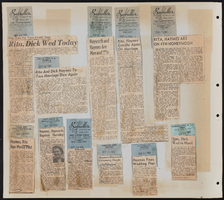Search the Special Collections and Archives Portal
Search Results

Interview with Cecil C. Garland, July 19, 2006
Date
Archival Collection
Description
Text

Rodel Fuentes oral history interview: transcript
Date
Archival Collection
Description
Oral history interview with Rodel Fuentes conducted by Tracy Fuentes on December 4, 2021 for Reflections: The Las Vegas Asian American and Pacific Islander Oral History Project. Rodel Fuentes tells stories of his upbringing in Manila, Philippines, where he was raised in a shared family home amongst his parents, siblings, aunts, and uncles. He talks about his parents' immigration to the United States and how he later joined them in Los Angeles, California where he met and married his wife. Rodel Fuentes shares the couple's decision to move to Las Vegas, Nevada, his work at Dunn Edwards paint company, and how he became a licensed general contractor and real estate agent where he now owns his own company. Rodel Fuentes discusses his thoughts on Las Vegas' diversity, affordability, restaurants, and Asian community. He also talks about experiencing anti-Asian hate, worsened by misconceptions and discrimination that came from the COVID-19 pandemic.
Text

Transcript of interview with Otto Merida by Claytee White, May 18, 2017
Date
Archival Collection
Description
When looking back on his legacy in the Latinx community of Las Vegas, Otto Merida (1945 - ) takes great pride in being a Latin Chamber of Commerce [LCC] co-founder with Arturo Cambeiro. With the LCC, they forged a powerful economic entity that continues to provide the local Latino community with social and political influence. Growing up during the 1950s in Havana, Otto Merida fondly remembers his childhood despite living under the dictatorship of Fulgencio Batista. There were the murmuring sounds of explosions from afar on the way to baseball games, but also the warm Sunday family meals of Cuban soup with fideos. In this interview, he talks about the rising communist powers inspired by revolutionary Fidel Castro and the events that led his family to place him in the Peter Pan Program in 1961. The Peter Pan Program sent unaccompanied Cuban children to the United States to avoid potential instruction by Castro’s government. Merida still holds on to his mother’s final request upon leaving Cuba-“I want you to remember the address where we live and the phone number: Josefina 68-entre primera y segunda-La Víbora, Havana con el teléfono X4304.” As a part of the Peter Pan Program, Merida experienced a nomadic childhood living in barracks in Miami and a three-story home in Wilmington, DE. The only connection he had to his family were a series of letters he exchanged with his mother, until they reunited years later in Miami. For Merida, life on 79th Street and Biscayne Boulevard in Miami was defined by the values of his family and other Cubans and African Americans in his neighborhood. v Merida earned his bachelor’s degree in Political Science from the University of Florida. He credits his sister-in-law with a pivotal role in his decision to pursue a higher education. His engagement in politics continued through his involvement with the Cuban Circle, the first Hispanic community to be involved with politics in Las Vegas. He describes the migration of Cubans to the casino scene of Las Vegas and the presence of Cubans in the community. His work with the Cuban Circle inspired him to develop a political presence for Hispanics in the community. While travelling across the United States before settling in Las Vegas, Merida made many significant relationships while working with associations such as the Fitchburg Chamber of Commerce and Volunteers in Service to America [VISTA]. Living in Las Vegas, Otto Merida worked as an educator and community organizer. In the late 1970s, Merida and Arturo Cambeiro collaborated to create the Latin Chamber of Commerce of Las Vegas. For Merida, the Chamber consistently goes above and beyond the vision he and Cambeiro had created when they first opened their doors. From the creation of the Latino Youth Leadership Program at UNLV to their work alongside political figures such as Senator Catherine Cortez-Masto, Merida is extremely proud of the various accomplishments of the Chamber. Now as President Emeritus, Otto Merida continues to dedicate himself to the Chamber as a volunteer and serves as one of the many Latinx Voices of Southern Nevada that have shaped the greater Las Vegas community.
Text

José Luis Gutiérrez oral history interview: transcript
Date
Archival Collection
Description
Oral history interview with José Luis Gutiérrez conducted by Maribel Estrada Calderón and Barbara Tabach on October 1, 2018 for the Latinx Voices of Southern Nevada Oral History Project. Also present during this interview is José's close friend Sergio Salgado, who was interviewed separately for the Latinx Voices project in 2018. José discusses his early life growing up in Guadalajara, Jalisco, Mexico, and his migration to Tijuana and then Santa Barbara, California as a teenager. He talks about his restaurant employment history both in California and in Las Vegas, including his time working at the Jolly Parrot, the Dunes Hotel and Casino, and his own eatery: Tortilleria Los Arcos. Subjects discussed include: Tortilleria Los Arcos; Club Social Mexicano.
Text

Jeanettee L. Del Rosario oral history interview: transcript
Date
Archival Collection
Description
Oral history interview with Jeanettee L. Del Rosario conducted by Alessandra Del Rosario on December 6, 2021 for Reflections: The Las Vegas Asian American and Pacific Islander Oral History Project. Jeanettee Del Rosario talks about her family life with nine siblings and her upbringing in Urdaneta City, Pangasinan province, Philippines. She shares her educational background in hotel and restaurant management and, after immigrating to Las Vegas, Nevada in 2006, the different hotel positions she has held in the city. Jeanettee Del Rosario discusses the process of immigration, language barriers, and missing her family in the Philippines. She also talks about Filipino traditions of respect, barangay fiestas, cultural foods, and religion.
Text

Interview with Navor Tito Valdez, June 20, 2005
Date
Archival Collection
Description
Text
Tomiyasu Family Photograph Collection
Identifier
Abstract
The Tomiyasu Family Photograph Collection (approximately 1908 to 1991) consists of black-and-white photographic prints of the Tomiyasu family and their farming business in southern Nevada.
Archival Collection



